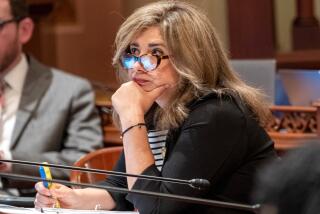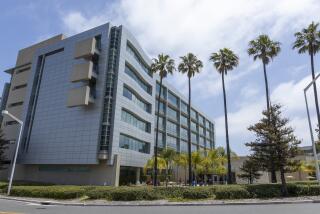Paper Typed in State Office, Ex-Aide Says
- Share via
SACRAMENTO — A former secretary to state Sen. Diane Watson (D-Los Angeles) said Thursday that, as a condition of her employment, she was told to type Watson’s doctoral dissertation on a state computer in addition to performing her normal clerical duties.
The secretary, Renee Francis, discussed her work on the dissertation in a letter addressed to Watson’s chief of staff in March, 1987. The former secretary wrote to complain about job stress because, in part, she was working overtime and on weekends to handle her secretarial tasks and the dissertation. Francis told a reporter Thursday that she stood by the contents of the letter.
Other staffers in Watson’s Capitol office also helped with the dissertation during working hours, a former top aide to Watson told The Times on Thursday. Francis would type the paper into the office computer while other staff members were asked to proofread it, the former aide said.
Watson on Thursday twice declined requests to answer questions about the preparation of the dissertation, titled, “The Effects of the Desegregation Controversy on Trustee Governance in the Los Angeles Unified School District 1975-1980.” The paper, dated April, 1987, was submitted to the Claremont Graduate School, which awarded Watson her Ph.D. in education.
State law prohibits the use of public equipment for personal projects, said Richard Martland, chief assistant in the attorney general’s civil division. It is not clear, however, if requiring a legislative secretary to perform personal clerical tasks on her off-hours is prohibited, Martland added.
“Basically, if you have official work that has to get done and you’re delaying that for personal work to be done, then I think there’s an issue there on whether that’s an appropriate use of the equipment,” said Martland, who declined to comment on the work done on Watson’s dissertation.
Stands by Complaint
Francis, now working for another legislator, was reluctant Thursday to discuss the dissertation, except to say that she stands by her written complaint and “it was my perception” that typing the thesis was part of her job.
In the March 11, 1987, letter, addressed to Jim Lott, Watson’s chief of staff, Francis wrote that she had planned to resign Dec. 31, 1986, because of stress and a disagreement over her official duties.
“You then reported that the senator requested that I stay until the end of February to complete her dissertation by the Feb. 28 deadline, and requested that I continue to do the clerical work at the same time,” Francis wrote. “I agreed.
“With the approaching deadline and my dedication to the senator to produce a truly professional dissertation, the past month or so I had been working ten to twelve hours a day and coming into the office on weekends,” wrote Francis. “This was necessary due to the numerous changes the senator continued to make on the dissertation, and to enable me to keep up with my regular clerical assignments.”
Medical Leave
Even when fatigue forced Francis to take a two-week medical leave from her normal office hours, she wrote that she still came into Watson’s office early in the morning and late at night to complete the dissertation.
“There appears to be a moral question of requiring me to use personal sick leave and vacation time to rest from job stress, especially if as a condition of employment, I was required to type the dissertation on uncompensated personal time, while performing most of the clerical work in the office,” Francis wrote.
Lott, who supplied a copy of Francis’ letter to The Times, agreed that the former secretary used Watson’s office computer to type the dissertation, but added that she never did it on state time. He said it was not a condition of her employment.
“What I told her was: ‘You volunteered to do that. At any time you didn’t want to do that, you didn’t have to,’ ” Lott said.
Typed During Working Hours
But Jeanette Burton, Watson’s former chief of staff, said the senator instructed her that Francis should be allowed to type the dissertation during working hours in 1986, especially during the legislative recess from September to December.
More to Read
Sign up for Essential California
The most important California stories and recommendations in your inbox every morning.
You may occasionally receive promotional content from the Los Angeles Times.










